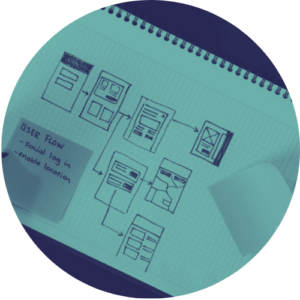Blog: The three biggest factors shaping the world of tax and accounting
- Accountancy
- UK Business
- 5 Min Read
The tax landscape is ever-changing. As current events and political shifts influence each government’s agenda, new policies are brought in: taxes are raised to fund new initiatives, new rules are introduced to encourage one behaviour or discourage another, and legislation is regularly tweaked, simplified or overhauled.
Accountancy as a practice is evolving too, as more financial technologies emerge that make the basic tasks of admin and compliance faster and easier, and government policy pushes us further towards a fully digital tax system.
To keep your business compliant with the latest rules and ensure you’re not missing any important opportunities, you need to be on top of what’s going on at every stage – or you need an accountant who keeps you in the loop.
At MPA, we don’t like to sit and wait for the next big change, and we don’t like to leave our clients in the dark either. Whatever sector you work in, these three key topics should feature in your business planning and risk assessment for the months ahead.
Environment and ethics

As climate change becomes more visible and the scale of the crisis is evidenced by new research, it’s impossible to ignore the impact we as individuals and as businesses have on the planet.
Concerns about environmental issues are increasingly reflected in public attitudes, which means purchasing and investment decisions, business practices, and government policy are all changing.
Those changes could have an impact on your tax obligations, through incentives for greener options such as electric vehicles, or penalties like the plastic packaging tax taking effect in April 2022.
Although many penalties for environmentally-unfriendly practices are aimed at large businesses, this could still have a knock-on effect for your supply chain.
Changing policies and attitudes could also affect your access to funding and investment. Environmental, social and governance (ESG) funds are growing popular among private investors, as an appealing option for those who are conscious about the impact of their money.
Steps are also being taken to prevent the rise of ‘greenwashing’, where investment products are packaged up to look more eco-friendly than they really are.
From a business perspective, it means you’ll be expected not only to implement sustainable and responsible practices, but also to show in tangible detail the actions you are taking.
If all of this sounds somewhat removed from the profit-focused number-crunching accountants tend to be known for, you might be surprised.
Just as achieving your business goals requires clear targets and a solid grasp of the numbers, so too does any effective assessment of your environmental and social impact.
You might choose to calculate your carbon emissions or water consumption and include those details in your annual accounts.
Alternatively, you might want to implement a system such as triple-bottom-line accounting, which demonstrates your commitment to people, the planet, and your profits.
In any case, backing up your claims with hard facts is more likely to convince investors and stakeholders than talking about your values alone, and a specialist accountant – like us – can help.
Data collection and protection

So many aspects of our lives now leave a digital trace, whether that’s through the cookies saved when you shop online or browse the web, the emails you send or tweets you post, the photos saved to the cloud on your phone, the music and films you stream, or the information picked up by any device in your home that can connect to the internet.
The amount of information being received, stored and transmitted globally is growing exponentially, with a 2018 report by the International Data Corporation (IDC) predicting that by 2025, global data volume will stand at a total of 175 zettabytes.
For context, a single zettabyte is equal to a trillion gigabytes. If one person were to download all of that information at a connection speed of 25 Mb/s, the IDC explains, it would take them 1.8 billion years to do it.
This has presented businesses with both opportunities and challenges. The world’s largest businesses have access to such large quantities of data that it cannot be handled by ordinary data-processing software – this is what the term ‘big data’ refers to.
Small and medium-sized businesses tend to be working with smaller datasets than that, but these can also offer valuable insights. The difficult part is often accessing the resources or implementing the systems needed to collect the right data and process it correctly.
You might remember preparing your organisation for the EU general data protection regulation (GDPR) that took effect in 2018. During the rollout of this legislation, many accountants took on a leading role in informing their clients about the changes, and helping them to review their systems and stay compliant.
Those rules are still in force, having been incorporated into UK law after Brexit, although the Government has hinted at plans to put its own data protection laws in place in the future.
Either way, it’s still important that you’re handling any customer data you collect securely, and that your accountant is prepared to advise you on any future changes.
Automation and the cloud

The technological advances of recent years haven’t just affected the availability of customer information – they’ve also created new ways of storing, securing and analysing your own data.
This is where the benefits of accounting software come into play.
Most modern accounting software platforms store data on the cloud. This is nothing new, of course, with the first major cloud products emerging in the 2000s, and take-up of those systems accelerating throughout the 2010s.
Xero, for instance, was launched in New Zealand in 2006 and in the UK in 2008. In 2011, the company celebrated reaching 50,000 paying customers; by 2017, they had passed the one million mark, and this year they reported having 2.7 million global subscribers.
At this point, cloud computing is simply a part of everyday life for many people and businesses. If you’re still using desktop software or spreadsheets to manage your accounts, it’s time to give this some serious thought.
That’s partly because new rules under the Making Tax Digital programme will make digital record-keeping and software-based tax returns a legal requirement for many businesses over the next couple of years.
It’s also because cloud accounting has several practical benefits. Because your data is stored remotely, you can log in and access your accounts from any device or location. You can also set your software up to automatically pull through information from your bank accounts and connect with add-on software.
Some of those software products use machine learning and other forms of artificial intelligence (AI) to automate even more of the work.
Expense management apps, for example, often use AI-driven optical character recognition (OCR) technology to extract written information from images of receipts or invoices. Reporting and forecasting apps can also use AI to identify patterns, detect anomalies, and predict future performance.
As those technologies become more powerful and more widely available, business owners and their accountants should have more tools at hand to improve efficiency, glean deeper insights from their data, and inform their strategic decisions.
Modern business
Being a modern accountant doesn’t just mean being a Xero gold partner (like us) and connecting with sustainability trailblazers (but we do); it means operating with the same business goals, concerns, interests, and approach as our clients, and really understanding what they want and need from the services we provide.
If you’d like to discuss how some of the points featured in this blog might impact you or how MPA differs from most accountants you’ll meet, get in touch today.
Let's chat
